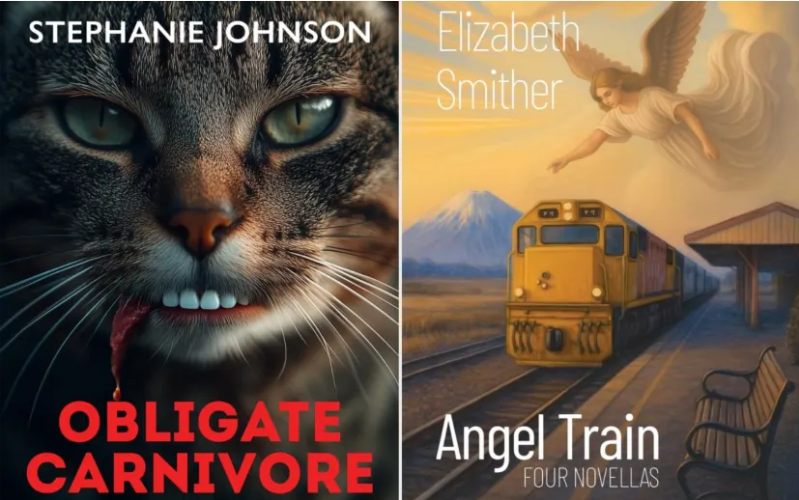
Elizabeth Smither's Angel Train and Stephanie Johnson's Obligate Carnivore, both of whom received one of the Prime Minister's Literary Awards, were removed from contention for the $65,000 Jann Medlicott Acorn Prize for Fiction in the Ockham New Zealand Book Awards
The New Zealand Book Awards Trust - which run the awards - said a bookseller suspected AI use and alerted organisers, upon which Christchurch-based publisher Quentin Wilson confirmed it.
Wilson said the decision was "heartbreaking", adding it was upsetting for the professional production and design team who worked on the books.
Johnson told Morning Report writers often had little to do with the creation of covers. But she had suggested a "wicked-looking cat with fake teeth" for her novel.
She said she understood why the Trust wanted to draw a line in the sand as the industry grapples with the alarming rise of AI, but she argued the literary work should outweigh concerns about a fictional book's cover.
This year is the first time AI regulations have been applied to the awards. The criteria spelled out in the entries pack state that books are judged as a whole — including jacket design — and that works containing AI-generated illustrations or AI-authored content are not eligible.
However, publisher Quentin Wilson said the covers would have been created many months before the entry guidelines were issued.
"If the Awards Trust had signalled its intention to change the criteria well in advance of the submission process (such major changes are normally signalled a year in advance), more nuanced and widely understood eligibility criteria could have been developed."

Nicola Legat, chairperson of the New Zealand Book Awards Trust, said the rules followed research and consultation with the local book sector and aimed to support creative and copyright interests.
"The Trust does not take lightly a decision that prevents the latest works of two of New Zealand's most esteemed writers from being considered for the 2026 award.
"However, the criteria apply to all entrants, regardless of their mana, and must be consistently applied to all."
Chloe Blades, manager of Unity Books Auckland and a judge in the PANZ Book Design Awards, supported the restrictions, saying they set essential parameters around creative integrity.
"Book covers speak to what’s inside the book, interpreted by sentient, compassionate, empathetic, thoughtful people, and it's those characteristics that AI can't offer that give a book its character and soul.
"I know this is a strong opinion and it’s ok for people to disagree, but people designing a book cover is, just like writing the book, how we maintain our industries creativity and integrity."
Blades said AI poses a significant challenge to the book industry but welcomed the broader conversation about its use.
"AI is as big a threat to books as Amazon was when it arrived, if not more so, and we survived that.
"We need to work together to only let AI into our industry in a way that works for us - and preserve what makes this industry great."
Legat said the Trust may revisit and refine the AI rules in the future.
The 2026 New Zealand Book Awards for Children and Young Adults, opening for entries this week, will include similar restrictions.
The Ockham New Zealand Book Awards celebrate literary excellence for books written by New Zealanders.
New Zealand's first Māori wahine professor Ngāhuia te Awekōtuku (Te Arawa, Ngāpuhi, Waikato) won the General Non-Fiction Award for her memoir Hine Toa: A Story of Bravery at the 2025 awards in May.
The longlists for most of the 2026 Ockham categories will be announced on 29 January, 2026.













